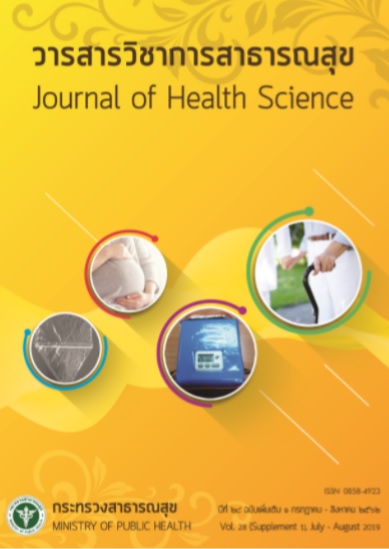Holistic Healthcare with Medicinal Dharma Principle of Diabetes Patients in Kantharawichai District, Mahasarakham Province
Keywords:
holistic health, medicinal dharma principle, diabetesAbstract
This study aimed to (1) study behaviors of holistic healthcare of diabetes patients, (2) compare holistic healthcare behaviors and blood sugar of diabetes patients before and after joining a medicinal dharma program with social support, and (3) examine format of holistic healthcare with medicinal dharma principles of diabetes patients in Kantharawichai District, Mahasarakham Province. It was divided in 3 phases. Phase 1 was quantitative research with populations of 2,270 diabetes patients with age range of 15-65 years in Kantharawichai District, Mahasarakham Province. The sample size was calculated to be 328, and the samples were selected through simple random samplings. Phase 2 was a semi-experimental research. The calculated sample size was 60 persons to be divided into 2 groups, 30 persons each. The experimental and the control groups were selected through cluster sampling method; the samples in Kudsaijor Sub-district were experimental group and those in Nasinuan Sub-district were the control. The third phase was a qualitative research. The participants included 45 persons selected with specific sampling method according to determined qualifications. The instruments in this research included (1) questionnaire, (2) activity program set, and (3) the in-depth interview. Data were collected from July 2015 to January 2018); and were analyzed with percentage, mean, standard deviation and analysis of covariance (ANCOVA) with significance at 0.05. It was found that holistic healthcare behavior of diabetes patients in Kantharawichai District, Mahasarakham Province was generally at low level (Mean=2.27, SD=0.25). Physical care was at moderate level while mental, social term and intellectual aspects were at low level. Finding of the phase 2 revealed that before experiment, the experimental group and the control group had different holistic healthcare behaviors, FBS and HbA1c, but with no statistical significance. After the experiment, however, significant difference was observed. Scores of holistic healthcare behaviors increased by 1.39 points (95%CI:1.06-2.58, p<0.001) with the difference of FBS level was increased to 39.76 mg/Dl (95%CI:26.79 to 52.73, p<0.001). Furthermore, after the experiment, the experimental group has HbA1c ≤7mg% up to 40.00% while the control group with HbA1c ≤7 mg% for only 6.67%. It was also observed that the format of holistic healthcare with medicinal dharma principles of diabetes patients in Kantharawichai District consisted of (1) Buddhist activity arrangement along with continuous conventional treatment such as listening to dharma and preaching and meditating, (2) diabetes patients’ regular meditation, (3) participation of community for healthcare, and (4) creation of health leader in the community. In conclusion, holistic healthcare with medicinal dharma principles along with conventional treatment could improve the outcomes of the care; and with participation of every health network, diabetes patients could have better quality of life.
Downloads
Downloads
Published
How to Cite
Issue
Section
License
Copyright (c) 2019 Journal of Health Science - วารสารวิชาการสาธารณสุข

This work is licensed under a Creative Commons Attribution-NonCommercial-NoDerivatives 4.0 International License.







